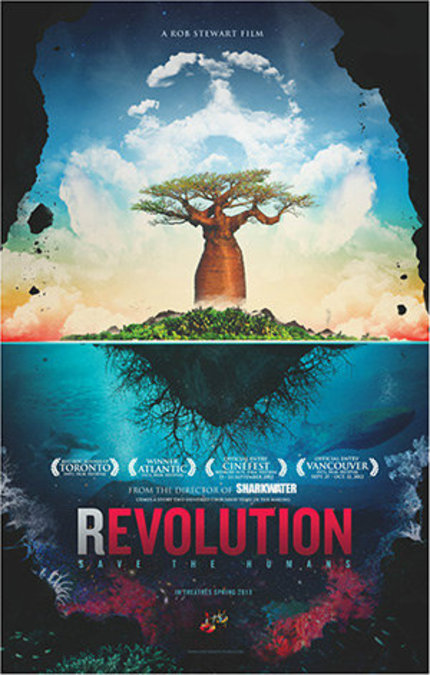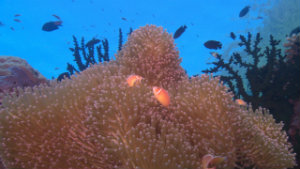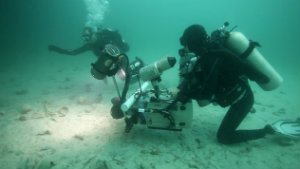VIFF 2012 Interview: Rob Stewart on REVOLUTION and his Plan to Save Humans From Extinction

Revolution takes a step back from a single issue and focuses instead on the greater environmental crisis that binds the fate of every living creature on Earth together. The "revolutionary" thesis Stewart puts forward involves the need for humans to think beyond our current understanding of capitalism, the disastrous implications of links between governments and corporate entities and ultimately suggests an economic growth fueled less by expansion and more by the kind of innovation required to ensure the survival of the species.
Sharks are a resilient species and have managed to survive five major extinctions throughout the course of their evolution. The question remains as to whether humans have the capacity to make it through one.
ScreenAnarchy: What makes a "good" environmental documentary? Because every time I watch one I think, "Well... this doesn't look good." They're inherently depressing.
Rob Stewart: I don't really like environmental documentaries, to be honest. Documentaries aren't my favourite either. I like them for their content, but I don't like the way they're structured and I don't really like the emotional journey they take you on.
I feel like we've got so little time on this planet and if I want to be entertained, I want to go somewhere, I want to be taken on a journey somewhere I've never seen. I feel like with a lot of them it's finger pointing, it's negative, and depressing and I'm not transported from the world that I live in into somewhere else.
But... you make environmental documentaries? Can we say that?
Oh yeah, they're environmental docs.
So wait a minute -
 I don't like most of them. I really like mine. [Laughs]
I don't like most of them. I really like mine. [Laughs] I think the way that I make them is different. I try to make them like feature films, that have a narrative and follow a traditional story structure. I still want to have them influence people into making better decisions, changing their lives and changing the world, but I want them to be a great journey. An escape, entertainment.
In either the worlds of the environmental or the broader "social movement" documentary or feature films, are there any that have influenced you in a positive way as a filmmaker?
Sure. The Power of One, Blood Diamond, Winged Migration. And Avatar.
Really?
Mmm hmm. BBC documentaries and nature movies are all pretty awesome, too.
The first turning point of your latest film, REVOLUTION, occurs when a young woman at a screening of SHARKWATER in Hong Kong seems to stump you with her question, which is basically, "If all of these studies are pointing to the end of the world as we know it, then what does it matter if sharks are hunted or not?"
It was a turning point for me, yeah. I'd spent the last ten years thinking I was changing the world, but not really tackling the issues in any way that could possibly really address the bigger problem. It made me realize that what I had done with Sharkwater, albeit teaching me how to change the world and teaching kids about how they can do things to save the planet, was just practice for doing something on a bigger stage. It made me realize I had to do something a lot bigger.
The scope and implications of the environmental issues presented in your documentary are overwhelming. Can we actually do something to harness effective change?
 Yeah. Not only can we, but we will.
Yeah. Not only can we, but we will. The rules of the road right now point towards disaster. If we fix some of those - say, take the government subsidies that are subsidizing the Alberta tar sands - and started subsidizing things that were good for the planet instead, we would have massive innovation. You'd unleash genius for coming up with new solutions for solar panels for energy, for redesigning our economy so that it's not built on growth.
In every revolution in the past we've had people aware of change -- they knew we needed equality racially, culturally, and for gender issues. Right now, only a fraction of the planet has any idea what's really going on. So the push for the kind of change we need - it's not light bulbs and Priuses - it's our system of economy. It's our corporations. And I think that if we got some of that correct, we would be there. The biggest impediment to getting something there is that government and corporations are a little too tightly intertwined. Sharkwater taught us that changing the world isn't actually that difficult; if you try, the world will change.
Is there any specific environmental issue over the past 20, 30 years that we can point to and say, "See? We did it. We made a change that made a significant difference."
Yes. The hole in the ozone layer and the moratorium on whaling. We nailed those.
You pointed out major obstacles in our modern way of life that are hard to get away from. Your own carbon footprint as both a Canadian and a filmmaker who flew around the world just to make REVOLUTION, is enormous. People have to drive to work in the morning. What's the compromise? Can we find one in this age that we live in?
If you actualize the cost of oil, petroleum, and fossil fuels on the world they would be enormously expensive; if you took into account the societal costs and the environmental costs, it would be prohibitively expensive, so that only people with an enormous amount of money could fly or drive. They would do that regularly or irregularly, if at all.
If we got some of these incentives in place we could perhaps be driving around with solar powered cars or cars that were powered on batteries powered by wind farms. Right now, we still are subsidizing the bad stuff. And as long as we're subsidizing the bad stuff, we have this system that's fucked and driving us towards disaster. The economy is still built on growth: We want more people, money, cars, and buildings. That fundamentally has to change before we change our light bulbs and our cars.
I was struck by a "factoid" in your film, which is that the government of China no longer serves shark fin at its functions. Currently, the Greater Vancouver Regional District is also attempting to ban their sale but they seem stymied by how to make it work in several different municipalities. Surely, if the government of China can make this happen so can the Lower Mainland of Vancouver. Is there something you might offer, as the de facto poster boy for shark conservation, to encourage them to make a similar commitment?
I think the GVRD can do it and I think Canada can do it as well.
Right now there's a petition on the Humane Society's website and it goes towards banning the importation of shark fin into Canada, effectively making it illegal. Canada can be a leader on this. The fact that we've got it banned in many other countries...
Isn't it banned in the greater Toronto area?
It is, yes.
We started a conservation group called United Conservationists and have a campaign called Fin Free, which is now an open source conservation group. Many groups, including ones in Vancouver, are using this to help get shark fin banned.
Another aspect of your films which is so impressive is, of course, the actual nature photography that you do. There's something transformative for a viewer about seeing living coral up close on the big screen, or even a dead zone - I had never even heard of those before! There are certain creatures you seem to especially enjoy filming.
 To take some of these animals whose evolutionary biology I know about, and portray them in a beautiful way through imagery is my favourite thing in the world.
To take some of these animals whose evolutionary biology I know about, and portray them in a beautiful way through imagery is my favourite thing in the world.Do you have a favourite? A creature-camera crush?
In Revolution, it's the flamboyant cuttlefish. That animal is amazing. I followed it around Malaysia for three weeks, photographing it every day, watching it laying its eggs.
A school of hammerhead sharks is my favourite thing in the world to film, and I would do that everyday if I could.
We've got two movies we're developing, one's called Under Pressure, which is a film about misfit life in the ocean, from hundreds of millions of years ago that couldn't compete and got pushed into the deep dark trenches, but because they got pushed away they escaped major extinctions and survived, with their grotesque adaptations...
That's interesting casting, having to find elusive beasts in the ocean's depths.
They're hard to find. There's not a lot of life down there.
We're also doing a film called Dragon Reef. It's a pygmy seahorse love story. We follow a baby seahorse from the time its born, swept into the open ocean, avoiding getting eaten by whale sharks and manta rays and boarding the night migration plankton until it finally hits ground, trying to find its way back through the muck, back to the coral that it can't live without. Then when it gets there they mate for life and the guy gets pregnant.
That in and of itself is revolutionary! I've always maintained that impregnating males would be the ultimate female superpower.
It's pretty amazing, and part of the reason seahorses have managed to survive is because the guy chips in. Evolutionarily, what would happen is the female would lay eggs and deposit them in the ground, and the guy would care for them a little bit, then pick them up a little bit. Eventually they grew a pouch for this and then eventually, the female just started putting eggs in the dude's pouch. Because of that, more baby seahorses survived. The guy chipping in has made this species last.
Maybe feminists need to co-opt the seahorse as some sort of evolutionary mascot.
Sure!
Speaking of evolution, have you considered adding narrative features as a part of your filmmaking career?
 It's not my filmmaking career that I'm worried about. I know too much to not try to have the most profound influence I can on the planet. I'll do whatever I think will change the world the most. I've been thinking lately about what to do next; they are pretty big and they would seem radical from a capitalist or modern societal perspective, but I think they are absolutely what needs to be done.
It's not my filmmaking career that I'm worried about. I know too much to not try to have the most profound influence I can on the planet. I'll do whatever I think will change the world the most. I've been thinking lately about what to do next; they are pretty big and they would seem radical from a capitalist or modern societal perspective, but I think they are absolutely what needs to be done. If I design a fictional feature film around young people attacking civilization, trying to execute these ideas, then I can maybe plant that seed in society: For us to fix this, then here it is in a silver platter. This is how you do it.
I am trying to imagine this as your typical mainstream feature or as an exploitative genre flick...
What's an exploitative genre flick?
Oh, you know, think Robert Rodriguez or Quentin Tarantino but framed as an environmental shoot-em-up.
I don't know what style it would take. I have to think about it. But I would go as mainstream as possible, something that would make hundreds of millions of dollars at the box office. It would mean a lot of people would see the message and a lot of people would have that idea planted in their head about what kind of change they need to help usher in.
Everything that we're talking about here - it's so intense, so heady, so emotionally draining. What do you do to lighten your emotional load? Just now you said, "I know things." That's so ominous! I am sure being in your position you know horribly frightening and depressing things that have yet to be distilled in such a way so that laymen, such as myself, could even begin comprehending. How do you find balance required to maintain the level of optimism required to persevere?
 In two ways: First, I treat this like we're at war, which we are. We've got to dedicate our lives to it so there's no point in wallowing in despair.
In two ways: First, I treat this like we're at war, which we are. We've got to dedicate our lives to it so there's no point in wallowing in despair. The other side of it is that I am really inspired, and I do think we're gonna do this and I do think that we're gonna have a great deal of fun doing it. It's going to be nothing but good for the planet, for other species, for humans, for evolution. For us to tackle this we've got to come together.
We have to grow, we have to love each other, and give a shit about other species, other ecosystems, and other people - even if we haven't seen them yet. We have to usher these things and it could be paradise, here on earth, for us and millions of other species. If we get this right we could go to the rivers and the lakes for fish instead of salmon farms, we could have food growing on all our roofs. This could be amazing.
Revolution plays VIFF on October 6, 7 and 10 and will open theatrically in March, 2013.

Do you feel this content is inappropriate or infringes upon your rights? Click here to report it, or see our DMCA policy.






